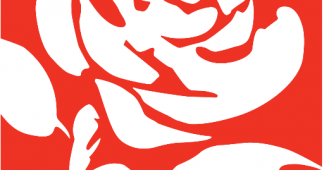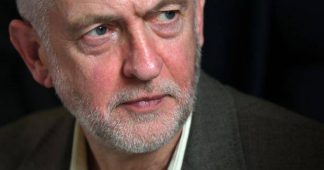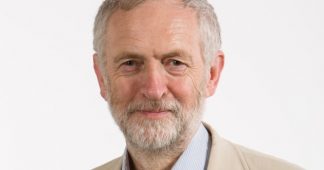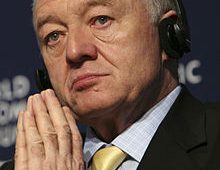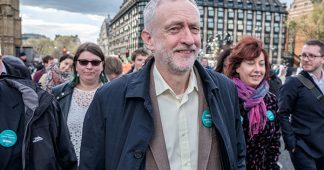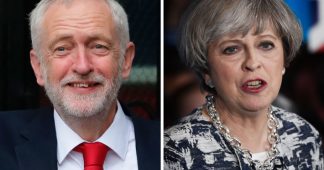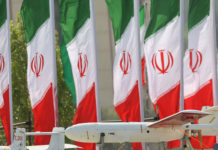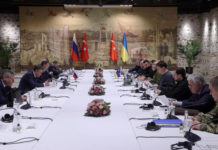By Daniel Finn
Since 2015, the British Labour Party has stood apart from the wider picture of Europe’s centre left. Under a leadership derided from the start as a fossilized remnant whose strategy was bound to result in calamity, Labour clawed its way back from electoral and organizational decline, during a period that saw its sister parties in France and Germany slump to unprecedented troughs; its dramatic increase in membership has made it the largest political party in Western Europe. The party’s leader Jeremy Corbyn, a left-wing veteran who was on a path towards retirement when the 2015 leadership contest catapulted him to centre stage, is currently in contention to become the next British Prime Minister. The turn-around has been all the more remarkable given that, for a quarter of a century, Labour was the most hawkishly militarist and neoliberal centre-left party in the developed capitalist world.
Yet the Corbyn project faces a number of obstacles that may prove insurmountable. The Labour Party itself is far from being a reliable instrument in Corbyn’s hands: while the leader and his allies have strengthened their position since the electoral breakthrough of 2017, they still face unremitting hostility from the party’s right wing, to supplement that of their Tory opponents and the mainstream media. Labour’s programme of social-democratic reform may be modest in historical perspective, but it represents enough of a departure from established orthodoxy to provoke fierce resistance from business and the state machine—especially if Corbyn also tries to recalibrate British foreign policy after taking office. Before it can reach that point, Labour has to navigate an issue—Britain’s departure from the eu—that cuts through the heart of its electoral coalition and has no precedent in post-war British experience. Brexit has thrown the whole political field into confusion, and Labour will struggle to achieve a majority in parliament after the next election, even if it emerges as the largest party. The conditions of its likely coalition partners, the Liberal Democrats and the Scottish National Party, could include the extinction of any distinctive Corbyn project.
All factors seem to point towards ultimate defeat, except one: the fact that Corbynism has already survived against the odds to reach its current position. After nearly four years of a surprisingly tenacious political experiment, it should be possible to draw up a provisional balance-sheet. This article will examine the extent of Labour’s internal transformation under Corbyn, as the necessary precondition for any wider success. What is the present state of play within the party? How has the Corbyn leadership coped with its treatment by the British media, and with the challenges of the Brexit process?
Actually existing labourism
In contrast with the new left-wing movements that have come to the fore in Greece, Spain or France since the financial crisis, comparable energies in Britain have been channelled through a long-established party with a century’s worth of organizational baggage to weigh it down. The British Labour Party was a late arrival: in the early 1900s, at a time when the German Social Democrats had already become the largest force in the Reichstag, Labour was just beginning to emerge from the shadow of the Liberal Party. The party adopted from the start a reverential attitude towards the Mother of Parliaments. A constitution drafted by Sidney Webb in 1918 codified its ideology and organizational form. Constituency Labour Parties (clps) permitted individual membership for the first time, mirroring parliamentary boundaries rather than workplace or residential communities. A new constitution, its Clause Four nominally committing Labour to ‘common ownership of the means of production, distribution and exchange’, appealed to those radicalized by the temper of the times. But real power within the party lay with the trade-union leaders who supplied most of its funding, expressed through a block vote at Labour conferences and on the National Executive Committee (nec), while deference to Westminster gave the Parliamentary Labour Party (plp) full autonomy from the rank-and-file.
After two minority administrations—the second of which ended in catastrophe for Labour—and membership of national-coalition governments in both world wars, the party finally had the opportunity to govern from a position of strength after its landslide victory in 1945. Clement Attlee’s government showed the limits of Labour’s reforming ambitions, even at its high point. At a time of enormous popular desire for change, its agenda remained within strict limits. Nationalization of certain industries was never intended to be the first step towards a socialist economic system: Labour’s goal was to preside over a ‘mixed economy’ where private ownership was predominant. Attlee’s government also illustrated another perennial feature of Labourism, from Ramsay MacDonald to Tony Blair: its unflinching commitment to Britain’s ‘global role’. In the days of empire, that meant dogged support for the Great War and the Colonial Office; after 1945, all-round Cold War Atlanticism, fervent pursuit of the A-Bomb, and cuts to social spending to fund military operations in Korea and Malaya.
Labour possessed a left wing that took the ideas embodied in Clause Four seriously but was unable to challenge the leadership to any great effect. From the Socialist League of the 1930s to the Bevanites two decades later, socialist currents broke against two immovable rocks: the trade-union block vote and the autonomy of the plp.footnote1 The most determined effort came after the election defeat of 1979, in an attempt to draw a line under the Callaghan government’s imf-mandated austerity budgets. The Campaign for Labour Party Democracy proposed constitutional reforms that would make all mps subject to mandatory reselection by their clps and change the system for electing the party leader: from now on a tripartite electoral college, representing mps, trade unions and party members, would make the choice, rather than the plp alone. The left current grouped around Tony Benn hoped that these organizational remedies would create a parliamentary cadre sufficiently combative to implement a more radical programme.
However, the existing mps had other ideas. A liberal-Atlanticist section of the Labour right broke away to form the Social Democratic Party (sdp), anathematizing their former colleagues and splitting the anti-Conservative vote. Internal divisions, the sdp split, Michael Foot’s ham-fisted leadership, and the ‘Falklands factor’ accruing to Margaret Thatcher after her South Atlantic triumph knocked Labour out of contention for the 1983 general election. A ceaseless vendetta against the Bennite left ensued, under the direction of Neil Kinnock. By the time Tony Blair became Prime Minister in 1997, Labour’s programme stood well to the right of anything put forward by his most conservative predecessors. Blair and Gordon Brown, his Chancellor and eventual successor, upheld the main features of the post-Thatcher settlement, preserving her draconian anti-union laws and keeping privatized industries out of state hands. In some respects they went further than Thatcher had dared: imposing university tuition fees, making the Bank of England independent, and extending ‘marketization’ into the fields of education and health care. Brown also encouraged the worst proclivities of Britain’s financial sector under the rubric of ‘light-touch regulation’. On the international stage, Labour took on a belligerent role not seen since the last days of empire, serving as Washington’s loyal attack-dog from the Balkans to Afghanistan and Iraq.footnote2
Radical opposition to Blair and Brown’s policies mostly bypassed the Labour Party altogether, leaving its residual left faction becalmed. By 2010, when the Tories returned to office in coalition with the Liberal Democrats, mps like Jeremy Corbyn and John McDonnell looked more like refugees from a Bennite Atlantis than the vanguard of a future left-wing revival.footnote3 On the very eve of Corbyn’s accession to the Labour leadership, McDonnell described the current moment as ‘the darkest hour that socialists in Britain have faced since the Attlee government fell in 1951’, characterized by ‘the overwhelming incorporation of so much of the Labour Party into the political and economic system that the Labour Party was founded to transform’.footnote4 In order to grasp the scale of the challenge that Corbyn and his supporters have faced, it is vital to recognize that this analysis was in most respects quite accurate.
The outsider
Nevertheless, by the summer of 2015, in the aftermath of a Tory election triumph, three factors were about to transform that situation. The first, hardest to quantify, was growing anger at the post-crisis austerity policies of David Cameron and George Osborne, especially among the economically vulnerable young; with this—catching the winds blowing from Greece and Spain, the ‘movement of the squares’ and Occupy—went a willingness to contemplate more radical and egalitarian solutions to the crisis. Secondly, when Brown’s successor Ed Miliband tried to reform the process by which a Labour leader was chosen, it proved to be a dramatic own-goal for the party elite.
The Unite trade union had been promoting the selection of sympathetic candidates as a mild corrective to years in which right-wing loyalists had been parachuted into safe Labour seats. Largely fictitious claims of organizational skullduggery by Unite officials in the Scottish constituency of Falkirk prompted Miliband to commission a report into the party–union link. The Collins Review urged a number of steps to weaken the power of the unions, including the withdrawal of their one-third vote share in the electoral college for the leadership election. The Unite general secretary Len McCluskey accepted this in return for a symmetrical move by Labour’s parliamentary representatives: Labour mps could no longer serve as gatekeepers for the leadership, apart from the requirement that any candidate would have to be nominated by 15 per cent of the plp.footnote5 For the first time, Labour leaders would be chosen on a one-member, one-vote basis. The Blairite faction added the suggestion that non-members be allowed to register as supporters for a £3 fee and cast a vote of their own—a move towards the American open-primary model.footnote6 Unsuspected at the time, the organizational preconditions for Jeremy Corbyn’s ascent were now in place.
Finally, the outcome of the 2015 leadership contest owed as much to the manifold weaknesses of the Labour establishment as it did to the discovery of unexpected strength among its left-wing critics. Following Miliband’s resounding defeat in the 2015 election—232 seats, compared to Cameron’s 330—members, supporters and unions alike asserted the need for a change of direction. Labour’s calamitous performance in Scotland, where the snp had trounced it after linking the cause of independence with opposition to austerity, offered an especially sharp lesson. Yet the mainstream candidates all proposed to tack right in response to Miliband’s failure, leaving Corbyn as the only standard-bearer for a different approach.
Born in 1949, raised in a radical-bohemian family in rural Shropshire, Corbyn was a local anti-racist activist from his early teens. By his mid-20s, he was a hard-working stalwart of London’s Labour left. Elected to the House of Commons in 1983 from an inner-London constituency, Islington North, that contains in miniature form many of the capital’s polarities—between wealth and poverty, native-born and immigrant communities—he was known as a diligent constituency worker with a particular interest in international affairs. During the Blair years, he consistently voted against New Labour’s economic agenda, from welfare cuts to the marketization of public services, and against its encroachments on civil liberties. Corbyn’s public profile stemmed above all from his opposition to Blair’s foreign adventures: he condemned nato’s bombing of Yugoslavia and steadfastly opposed the serial invasions and regime-change projects of the ‘war on terror’, endorsing the Stop the War Coalition and later serving as its chair. He took a keen interest in Latin American politics and shared the hopes of the ‘pink tide’. The extraordinary vitriol that Corbyn inspires in his opponents, seemingly out of all proportion to the content of his programme, is mainly a reaction to his record of consistent heterodoxy on foreign-policy questions.
The format of the 2015 leadership election played to Corbyn’s strengths. Never an especially rousing orator, he was nonetheless perfectly comfortable addressing large crowds, or taking questions from an audience of Labour supporters. His rivals had lost the ability to do so—if they ever possessed it in the first place—having trained themselves to speak in robotic sound-bites, with news anchors as their main sparring-partners. Corbyn’s paucity of experience in television studios placed him on a steep learning curve when he ascended to the leadership, but his unpolished demeanour was more of an asset than a liability during this opening phase. His campaign relied upon unorthodox methods, with mass public rallies and the use of social media to by-pass established outlets.footnote7 In the summer of 2015 the first opinion poll put Corbyn at the head of the field, an advantage that he never surrendered. The most popular candidate with full members (almost 50 per cent voted for Corbyn—more than the favourites Andy Burnham and Yvette Cooper put together), he also won by a crushing margin among registered supporters. More unexpectedly, he received backing from some of the big trade unions, not least because Burnham, the erstwhile front-runner, had made a point of giving them the cold shoulder.footnote8
Baffled by the scale of Corbyn’s victory—59.5 per cent of the vote on the first round, 40 points clear of the nearest challenger—his Labour opponents soon fell back on comforting myths. The fault, they suggested, lay with Miliband’s £3 supporters scheme and an influx of ‘Trotskyite entryists’ who had hijacked Labour’s internal processes. It was laughable to suggest that the dwindling membership of Britain’s Trotskyist groups could be numbered in the hundreds of thousands. Whatever else might happen, the fresh wave of political enthusiasm that now flooded into the Labour Party constituted a novel force on the British scene.
Read more at https://newleftreview.org/issues/II118/articles/daniel-finn-crosscurrents
